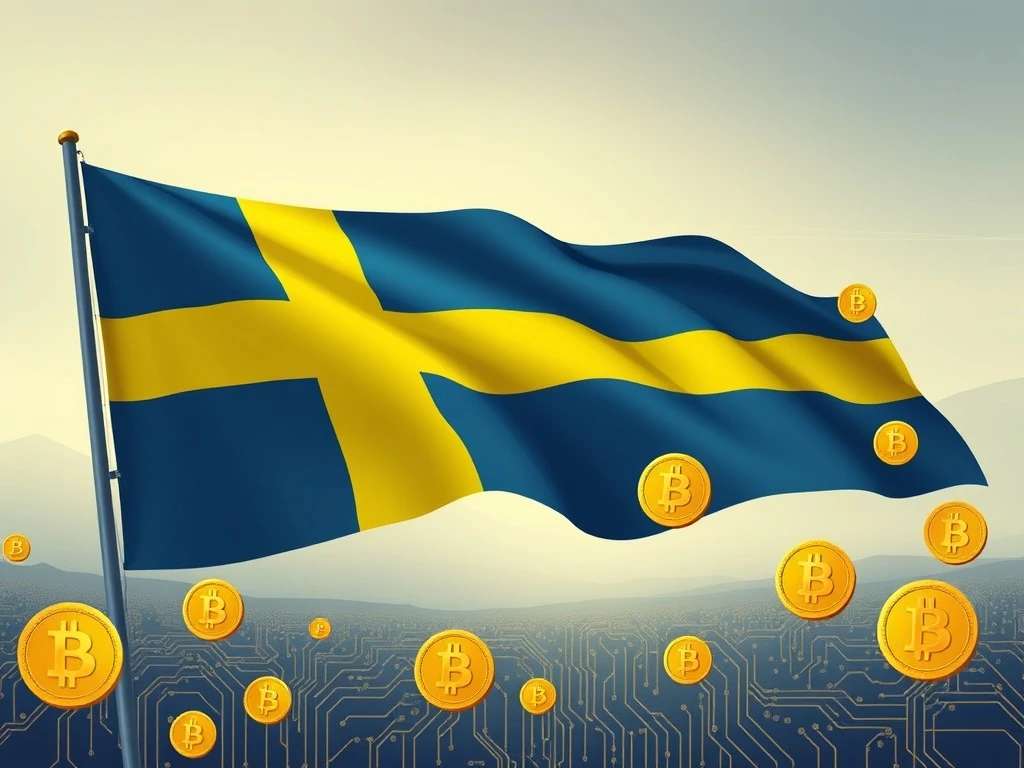Sweden Bitcoin Reserve: Pioneering a Bold Digital Future

Cryptocurrency enthusiasts often track nation-state interest in digital assets. A recent proposal from Sweden’s parliament, the Riksdag, has captured significant attention. Two members of the Swedish Democrats party have put forth a compelling case. They advocate for Sweden to establish a Sweden Bitcoin reserve. This initiative aims to tackle inflation and diversify the nation’s financial holdings. This move could position Sweden at the forefront of a global shift in monetary policy.
Pioneering a Strategic Bitcoin Reserve
The proposal originates from Dennis Dioukarev and David Perez, influential Swedish Democrats. Their party plays a crucial role in backing the current ruling coalition. On Wednesday, they submitted their groundbreaking idea to the Riksdag. They propose that Sweden investigate creating a strategic Bitcoin reserve. Furthermore, they seek a government commitment. This commitment would prevent changes to the legislation governing the Riksbank’s monetary policy. This action would signal no intent to introduce a central bank digital currency (CBDC).
Dioukarev and Perez highlight a global trend. Other nations, including the United States, are already exploring or creating similar reserves. They argue Sweden must “participate in this digital arms race.” They believe the country should “join the growing group of nations that have accepted and recognized the potential of Bitcoin.” This vision positions Sweden as a proactive player in the evolving global financial landscape.
Funding the Digital Reserve: Seized Bitcoin
The Swedish Democrats have suggested a practical funding mechanism. They propose using seized Bitcoin to establish the reserve. This approach mirrors ideas floated in other countries, including the US. However, the authority responsible for managing the Bitcoin (BTC) remains an “open question” for now. Sweden currently holds no publicly listed Bitcoin, according to Bitbo data. Yet, a law introduced in November 2024 allows authorities to confiscate luxury items. This includes crypto, even if individuals are not direct targets of an investigation. This legislation provides a potential pathway for accumulating digital assets.
Advocates for nation-state Bitcoin reserves envision a significant future. They speculate that these treasuries are the next step. They believe this will solidify Bitcoin’s role as a global reserve currency. Ultimately, Bitcoin could become the standard monetary unit worldwide. This long-term outlook underscores the strategic importance of such a reserve.
Boosting Bitcoin Adoption Sweden: A Hedge Against Instability
The Swedish Democrats hold considerable influence within the government. They received the second-largest number of votes in the 2022 general election, over 20%. They are a key partner in supporting the ruling coalition. This coalition comprises the Moderate party, Liberals, and Christian Democrats. Their backing gives them significant sway over the minority government’s agenda. This political leverage strengthens the possibility of their proposal gaining traction.
Dioukarev and Perez assert that building a Bitcoin adoption Sweden reserve is a strategic move. They state it positions Sweden for a potentially “disruptive shift in the global financial infrastructure.” They argue for a Bitcoin reserve alongside Sweden’s existing currency and gold reserves. These traditional reserves are often susceptible to “political, geopolitical, and economic risks.” Bitcoin, conversely, offers a distinct advantage. Its value is not tied to the monetary policies of individual states. Nor is it driven by any specific economy. This characteristic can significantly reduce the overall correlation in the national reserve. It offers a unique protection against global unrest.
Signaling Innovation and Economic Resilience
Owning Bitcoin sends a clear message. Dioukarev and Perez believe it “signals that a nation is open to digital innovation.” Sweden already boasts a vibrant crypto sector. Tracxn, a company database platform, lists 85 companies operating in this space. Notably, 20 of these firms have collectively raised $48 million in venture capital and private funding. The top five crypto companies in Sweden include an exchange and a cold wallet developer. This existing ecosystem demonstrates Sweden’s readiness for digital advancements.
From a practical standpoint, a Bitcoin reserve offers protection against inflation. Its immutable 21 million supply cap ensures scarcity. Transaction speeds are often faster than those of fiat currencies. Moreover, the costs associated with Bitcoin are negligible in comparison. “Bitcoin is currently the world’s sixth largest asset,” they stated. “It stands on par with silver and surpasses global companies such as Tesla, Meta, and Amazon.” Despite its current stature, they recognize Bitcoin is still early in its journey. Its exact future role in the economy remains to be seen. This cautious optimism underscores a thoughtful approach.
Sweden’s Role in the Digital Arms Race
Dioukarev and Perez are not the first Swedish lawmakers to advocate for a Bitcoin reserve. In April, Rickard Nordin, a Swedish MP and deputy leader of the Centre Party, urged Finance Minister Elisabeth Svantesson to consider Bitcoin adoption. This growing political interest highlights a broader recognition of Bitcoin’s potential. Bitcoin is legal in Sweden, and crypto ATMs operate across the country. The Swedish Financial Supervisory Authority regulates exchanges. It also enforces Anti-Money Laundering and Know-Your-Customer regulations. This established regulatory framework provides a solid foundation for further digital arms race participation.
The concept of a “digital arms race” extends beyond just accumulating Bitcoin. It encompasses embracing technological innovation and adapting to a rapidly changing financial landscape. Nations that strategically position themselves with digital assets like Bitcoin may gain a competitive advantage. They can enhance their economic sovereignty and resilience in an increasingly interconnected world. Sweden’s proposal is a clear indicator of this forward-thinking approach.
Addressing the CBDC Sweden Debate
Alongside the Bitcoin reserve proposal, Dioukarev and Perez have another crucial objective. They want the government to promise against altering the definition of legal tender in the Riksbank Act. This act governs the monetary policy of Sweden’s central bank, Sveriges Riksbank. Their aim is to clearly demonstrate that Sweden “doesn’t intend to introduce a CBDC.” This stance is particularly interesting given Sweden’s advanced digital payment infrastructure. Most citizens already rely heavily on mobile payment apps like Swish.
The Riksbank did launch a CBDC pilot project in 2020. Its final report, released in March 2024, concluded that a CBDC’s introduction is “ultimately a political decision.” The Human Rights Foundation unveiled a CBDC tracker in November 2023. It cites improved payment efficiency and expanded financial inclusion as potential CBDC benefits. However, drawbacks include concerns about privacy infringement and new avenues for government corruption. The Swedish Democrats’ proposal reflects these broader concerns. They prioritize individual financial freedom and privacy over a state-controlled digital currency. This debate over CBDC Sweden versus Bitcoin highlights fundamental differences in monetary philosophy.
The proposal for a Sweden Bitcoin reserve marks a significant moment. It reflects a growing global trend among nations. They seek to diversify their financial strategies and adapt to the digital age. This bold move could solidify Sweden’s position as a pioneer in digital finance. It also signals a clear preference for decentralized digital assets over central bank digital currencies. As the global financial landscape continues to evolve, Sweden’s decision will be closely watched by nations worldwide.








